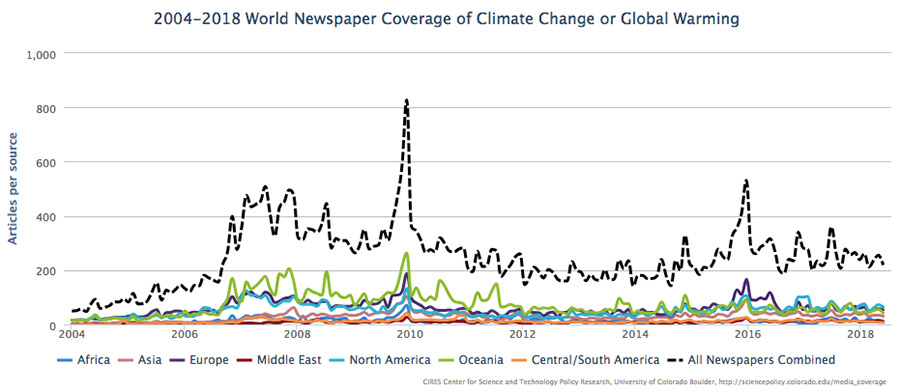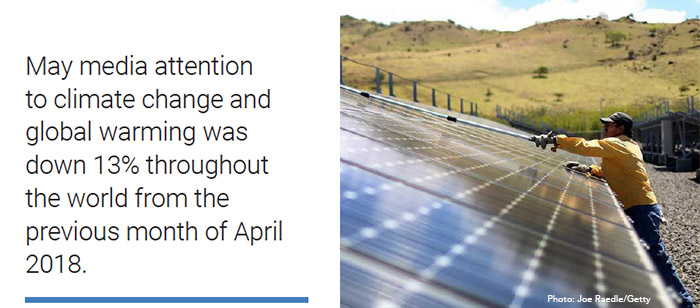Monthly Summaries
Issue 17, May 2018
[DOI]
Newspaper coverage in the Middle East and Oceania went down 35% and 23% respectively, while Asia dipped 10%, Europe diminished 6%, North America decreased 12% and African coverage was 18% lower than in April. Central/South America dropped 8%, while coverage in Africa held relatively steady.
At the country level in May 2018, newspaper coverage went down compared to April in Australia (-13%), New Zealand (-37%), India (-7%), the United Kingdom (UK) (-8%), Germany (-11%), and the United States (-17%). It held steady in Canada. Meanwhile, US television coverage decreased 14% from the previous month, while the six world radio sources monitored diminished 37% from coverage in the previous month.
Global newspaper coverage was about 10% lower than counts a year ago (May 2017), when a great deal of global media attention was focused on the Trump Administration’s impending (June 1, 2017) decision on whether or not to withdraw from the Paris Climate Agreement. This primarily political story pervaded cultural, economic and societal stories in May 2017 as well. For example, journalist Alexandra Zavis from the Los Angeles Times covered President Trump’s visit with Pope Francis. During that visit on May 23, 2017, Zavis wrote about how the Pope provided the President with a copy of his 2015 encyclical that called for global collective action to address climate change.
Figure 1 shows these ebbs and flows in media coverage at the global scale – organized into seven geographical regions around the world – from January 2004 through May 2018.

Figure 1. Newspaper media coverage of climate change or global warming in sixty-two sources across thirty-six countries in seven different regions around the world, from January 2004 through May 2018.
Moving to considerations of content of climate change or global warming coverage in May 2018, Figure 2 shows word frequency data in UK newspapers, juxtaposed with US television in May 2018. It is notable that the US-based media sources still continue to show signs of ‘Trump Dump’ (where media attention that would have focused on other climate-related events and issues instead was placed on Trump-related actions (leaving many other stories untold)). And as in previous months, content in media reporting outside the US context shows that this pattern of news reporting continues to be limited to the US. To illustrate, May 2018 news articles related to climate change or global warming in the US invoked ‘Trump’ 2935 times in 78 news segments (approximately 38 mentions per segment on average) on ABC, CBS, CNN, Fox News Network, MSNBC, and NBC. In contrast, in the UK press, Trump was mentioned in the Daily Mail & The Mail on Sunday, The Guardian & The Observer, The Sun, The Daily Telegraph & The Sunday Telegraph, the Daily Mirror & Sunday Mirror, The Scotsman & Scotland on Sunday, and The Times & The Sunday Times 632 times in 510 May articles (approximately 1.2 mentions per article on average). We have cautioned previously, however, that these current trends can quickly change, contingent on Trump Administration decisions that could rapidly influence media attention on climate change or global warming in the US and around the world.

Figure 2. Word clouds showing frequency of words (4 letters or more) invoked in media coverage of climate change or global warming in UK newspapers (left) and US television (right) in May 2018.
Many media accounts in May focused on primarily political – often tinged with economic – content associated with climate change and global warming. For example, a report called the ‘Global Electric Vehicles Outlook’ from the Paris-based International Energy Agency (IEA) at the end of May noted a record year for electric cars where “electric and plug-in hybrid cars on the world’s roads exceeded 3 million in 2017, a 54% increase compared with 2016” while “China remained by far the largest electric car market in the world, accounting for half sold” in 2017. The report noted, “The uptake of electric vehicles is still largely driven by the policy environment. The ten leading countries in electric vehicle adoption all have a range of policies in place to promote the uptake of electric cars”. NBC journalist Tom DiChristopher reported that the IEA “sees a pathway to 220 million electric vehicles by 2030, provided the world takes a more aggressive approach to fighting climate change and cutting emissions than currently planned”.
As another example of political economic content, BBC journalist David Shukman reported on the landmark agreement made at the International Maritime Organization talks, to cut emissions of greenhouse gases in the global shipping industry. Shukman noted that “shipping generates roughly the same quantity of greenhouse gas as Germany and, if it were accounted for as a nation, would rank as the world's sixth biggest emitter. Like aviation, it had been excluded from climate negotiations because it is an international activity while both the Kyoto Protocol and the Paris Agreement involved national pledges to reduce greenhouse gases”. Meanwhile in May, journalist Tom Embury-Dennis from The Independent in the UK reported that Costa Rica’s new president – Carlos Alvarado – has promised to begin a process to ban fossil fuels in the country, making it the first decarbonized nation on planet Earth. He said, “Decarbonisation is the great task of our generation and Costa Rica must be one of the first countries in the world to accomplish it, if not the first”. Bridging political with the cultural dimensions of climate change, in mid-May the Financial Times printed an open letter where global investors put pressure on multi-national oil and gas companies to take urgent action on climate change. Journalists Attracta Mooney, Andrew Ward and Leslie Cook wrote “big investors have demanded oil and gas companies intensify their efforts on climate change, in the clearest sign yet that asset managers and pension funds are increasingly concerned about the financial impact of global warming”. The open letter was co-authored by sixty investors accounting for US$10.5 trillion in assets, before upcoming annual shareholder meetings. They included Amundi (Europe’s largest asset manager), Aberdeen Standard Investments, Axa Investment Managers, BNP Paribas Asset Management, Fidelity International, Newton Investment Management and Legal & General Investment Management.
Meanwhile in May, coverage relating primarily to the cultural dimensions continued to draw attention. To illustrate, at the start of the month, Alaskan NBC affiliate KTUU noted that the 101st edition of the Nenana Ice Classic came to an end. This is an annual cultural sensation where participants pay a $2.50 entry fee to guess the correct date and time of the ice break in the Tanana River near Fairbanks. This year’s winners split the $225,000 jackpot. As an example of a cross-cutting scientific and cultural story, a study in Nature Climate Change by Manfred Lenzen and colleagues calculated that the carbon footprint of global tourism currently accounts for approximately 8% of global greenhouse gas emissions (attributed primarily to tourism-related emissions associated with transport, shopping and food consumption/production/distribution). Moreover, the study authors predicted this contribution may grow about 4% per year. Journalist Deborah Netburn from the Los Angeles Times summed it up when she wrote, “The people of Earth are traveling more often and farther than they ever have before, and it's taking a toll on the environment. For the first time, researchers have measured the carbon footprint of all aspects of global tourism, including air flights, car rentals, lodging and even the souvenirs travelers buy once they reach their destination”.
Media stories also intersected with scientific stories about climate change or global warming in May 2018. For example, a study in Science Advances by Sebastian Bathiany, Vasilis Dakos, Marten Scheffer and Timothy M. Lenton found that poorer countries will soon face increased swings between temperature extremes as a result of climate change. Journalist Christopher Joyce from US National Public Radio reported that the study also found that “temperature variability will be especially pronounced in the Amazon Basin and parts of Africa and Southeast Asia – wet places where a warming climate is drying things out”. As another example, a study by Dr. Chunwu Zhu and colleagues published a study entitled ‘Carbon dioxide (CO2) levels this century will alter the protein, micronutrients, and vitamin content of rice grains with potential health consequences for the poorest rice-dependent countries’ where they found that increased CO2 is connected with declining levels of key vitamins including iron and zinc. Journalist Nicola Davis from The Guardian quoted United States Department of Agriculture scientist (and study co-author) Dr. Lewis Ziska who said, “About two billion people rely on rice as a primary food source and among those that are the poorest, often the consumption of rice in terms of their daily calories is over 50%. Anything that impacts rice in terms of its nutritional quality is going to have an impact.”
Finally, media accounts delved into ecological and meteorological issues across the globe in May 2018. For example, news broke that changing climate conditions have contributed to a tripling of the number of vector borne illnesses from mosquito, tick and flea bites in the US between 2004 and 2016. Reporter Jacqueline Howard from CNN noted that this is “a growing public health problem”. Also in May, a heat wave centered in Karachi, Pakistan stressed emergency services as many dozens of residents have died from the heat. Journalist Salman Masood from The New York Times reported that “the Karachi authorities have urged people to stay indoors this week and keep themselves hydrated. Frequent power failures have compounded the misery. The heat wave coincides with Ramadan, the Muslim holy month, when Muslims fast from sunrise to sunset.”
June is here. Stay alert and stay tuned for further updates.

